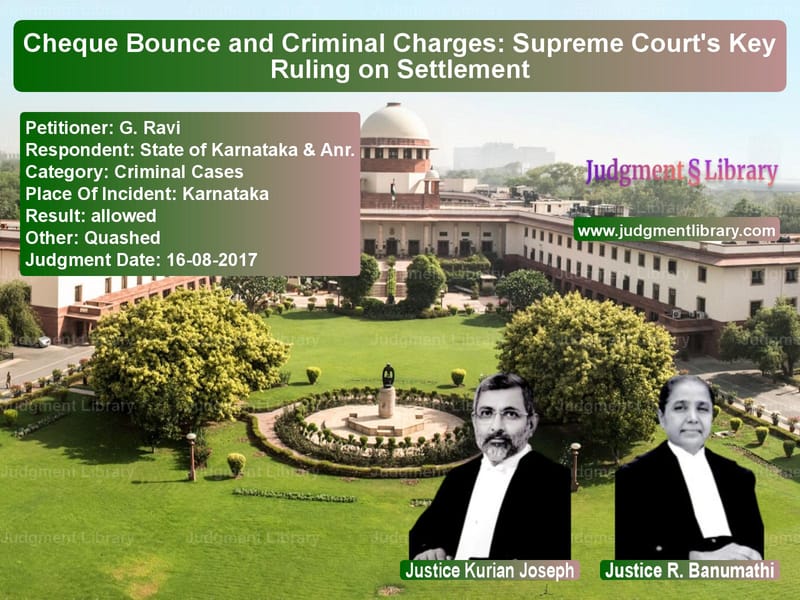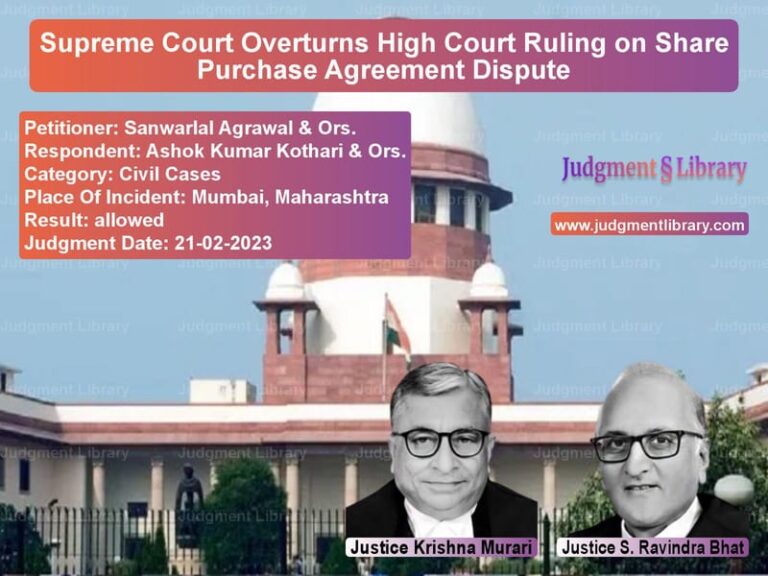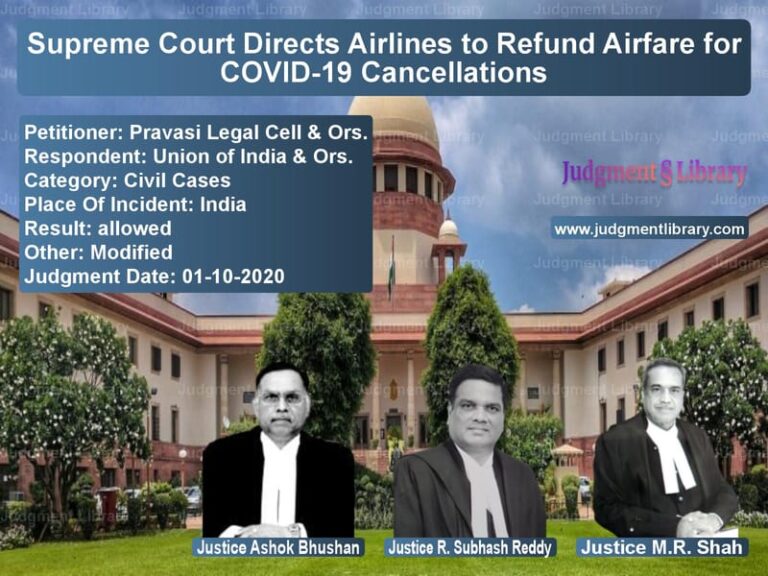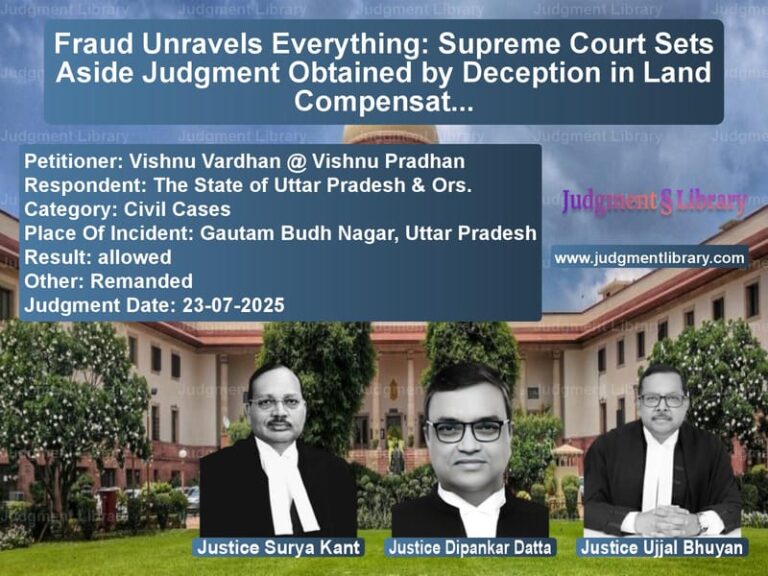Cheque Bounce and Criminal Charges: Supreme Court’s Key Ruling on Settlement
The Supreme Court of India, in the case of G. Ravi vs. State of Karnataka & Anr., ruled on a crucial issue regarding the quashing of criminal proceedings in a cheque bounce case where the parties had reached an amicable settlement. The dispute primarily involved allegations under Section 420 of the Indian Penal Code (IPC) for cheating and Section 138 of the Negotiable Instruments Act (cheque dishonor). The Supreme Court ruled that, since the parties had resolved their differences and the complainant had accepted the payment, continuing the criminal proceedings would serve no purpose.
The case has significant implications for financial disputes, reinforcing the judiciary’s inclination towards settlements in cases where no element of moral turpitude is involved. It sets a precedent for the exercise of judicial discretion in quashing criminal cases that arise out of negotiable instrument disputes.
Background of the Case
The dispute originated when the complainant, the respondent in the case, filed a complaint against G. Ravi, alleging that he had issued a cheque that was dishonored due to insufficient funds. Based on this, criminal proceedings were initiated under Section 138 of the Negotiable Instruments Act and Section 420 of the IPC.
The complaint was filed before the Judicial Magistrate First Class, Saundatti, in Karnataka. The Karnataka High Court refused to quash the proceedings, prompting the appellant to approach the Supreme Court. While the case was pending before the Supreme Court, the parties reached a mutual settlement.
Arguments by the Petitioner
The appellant, G. Ravi, made the following submissions before the Supreme Court:
- The dispute was financial in nature, and both parties had agreed to an amicable resolution.
- The complainant had consented to receive Rs. 3,50,000 as a full and final settlement.
- Since the complainant had already accepted the settlement amount, the continuation of criminal proceedings would be unjust and unnecessary.
- The judiciary has consistently held that criminal cases arising out of financial transactions should be quashed when the parties voluntarily reach a settlement.
Arguments by the Respondents
The respondents, including the complainant and the State of Karnataka, did not object to the settlement and made the following submissions:
- The complainant confirmed that he had accepted the agreed amount and no longer wished to pursue the case.
- The prosecution argued that the complainant’s consent to settle does not automatically negate the offense, as the court still retains discretion to determine whether to quash the case.
- The complainant, however, submitted that he had no interest in continuing with the case and requested the court to formally quash the proceedings.
Supreme Court’s Observations
The Supreme Court bench, comprising Justice Kurian Joseph and Justice R. Banumathi, examined the matter and made the following key observations:
“Since it is a matter essentially arising under Section 138 of the Negotiable Instruments Act, we are of the view that in the interest of justice and for securing ends of justice, the disputes are also given a quietus.”
The Court noted that the complainant had willingly accepted the settlement amount, and there was no public interest in continuing the criminal proceedings. It further stated:
“We are happy to note that the parties have decided to purchase peace, without prejudice to the legal contentions available to them.”
The Court also acknowledged that another case related to the same subject matter was pending before the Judicial Magistrate First Class, Mysore, and suggested that the complainant could bring the settlement to the attention of the concerned court to avoid unnecessary continuation of that case.
Legal Principles Affirmed
The ruling reaffirmed several important legal principles:
- Quashing of Criminal Proceedings in Financial Disputes: Courts have the power to quash criminal proceedings in cases where financial disputes have been settled between the parties.
- Encouragement of Settlements: The judiciary supports settlements in negotiable instrument cases to prevent unnecessary litigation.
- Application of Article 142 of the Constitution: The Supreme Court exercised its discretion under Article 142 to ensure complete justice.
- Impact on Pending Criminal Cases: The decision also provided guidance for dealing with similar pending cases in lower courts.
Precedents Cited
The Supreme Court referenced previous rulings where similar financial disputes were settled:
- Gian Singh vs. State of Punjab (2012) – The Court held that criminal cases involving financial transactions should be quashed if the parties settle voluntarily.
- State of Madhya Pradesh vs. Laxmi Narayan (2019) – It was observed that in cases where no element of public interest is involved, courts should encourage settlement.
- B.S. Joshi vs. State of Haryana (2003) – The Court held that in matrimonial disputes and financial transactions, settlements should be promoted.
Impact of the Ruling
The ruling in G. Ravi vs. State of Karnataka & Anr. is expected to have the following impacts:
- Encouragement of out-of-court settlements in cheque bounce cases.
- Reduction in backlog of cases related to negotiable instrument disputes.
- Increased reliance on alternate dispute resolution mechanisms.
- Greater flexibility for courts in using discretionary powers to quash criminal cases in appropriate circumstances.
Conclusion
The Supreme Court quashed the criminal proceedings against G. Ravi, stating that since the complainant had accepted the settlement, there was no reason to continue the case. The Court also acknowledged the existence of another related case in Mysore and allowed the complainant to seek relief before the concerned court.
This judgment provides clarity on the judicial approach to cheque bounce cases and reinforces that settlements should be encouraged to reduce unnecessary litigation. The ruling ensures that individuals engaged in financial disputes have an opportunity to resolve matters amicably without the prolonged burden of criminal prosecution.
Don’t miss out on the full details! Download the complete judgment in PDF format below and gain valuable insights instantly!
Download Judgment: G. Ravi vs State of Karnataka & Supreme Court of India Judgment Dated 16-08-2017.pdf
Direct Downlaod Judgment: Direct downlaod this Judgment
See all petitions in Cheque Dishonour Cases
See all petitions in Fraud and Forgery
See all petitions in Money Laundering Cases
See all petitions in Judgment by Kurian Joseph
See all petitions in Judgment by R. Banumathi
See all petitions in allowed
See all petitions in Quashed
See all petitions in supreme court of India judgments August 2017
See all petitions in 2017 judgments
See all posts in Criminal Cases Category
See all allowed petitions in Criminal Cases Category
See all Dismissed petitions in Criminal Cases Category
See all partially allowed petitions in Criminal Cases Category







